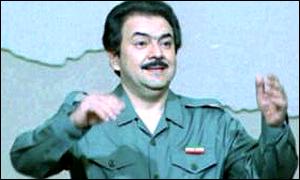The errors of Rajavi concerning the ideological schism of 1954 and its consequences are countless. His twelve-point statement issued while in the prison indicates Rajavi’s position taking toward leftist faction and Marxists as well as his offensive attitude towards religiously inclined forces that can be considered as one of his main errors. In addition, his keeping silent on the events occurred in MKO and the issue of the Marxist wing manifesto for almost one and a half year led to the intensification of the challenges between Rajavi and non-Marxist forces.
well as his offensive attitude towards religiously inclined forces that can be considered as one of his main errors. In addition, his keeping silent on the events occurred in MKO and the issue of the Marxist wing manifesto for almost one and a half year led to the intensification of the challenges between Rajavi and non-Marxist forces.
The significance of this issue arises from the fact that hiding the internal schism of MKO and conversion of a great deal of members to Marxism made religious forces think that Mojahedin leadership considered them nothing but instruments for achieving his objectives. There are evidences that Rajavi made his utmost attempt to conceal the schism of the organization and hide it though religious forces had the right to know to where their political and social activities were drifting them. Another mistake made by Rajavi in this particular phase was coining the term leftist opportunist to refer to the converted Mojahedin. In fact he did so to have least contact and tension with Marxist trends and stabilize his status as their strategic ally. In this regard, Shahsavandi says:
Leftist opportunist trend is the label Mr. Masoud Rajavi gave to the intra organizational Marxist trend and called it as such. 1
Hence, in his twelve-point declaration he asserted that he distinguished between the Mojahedin Marxists and other Marxist groups and considered them the strategic ally of Mojahedin as did previously. On the other hand, this moderately taken position was restricted only those in prison and there was no trace of the reaction against Marxist Mojahedin active in the world outside. Even when the liberation movement published Rajavi’s statement outside, Mojahedin declared that it was not acceptable for them and that it had to be revised. They kept this position up to late 1979 when Rajavi took a position against the separated wing.
The coming event during the Iranian revolution clarified the dual and divisive stance of Rajavi. The arrest of Taqi Shahram, leader of the Marxist wing, after the victory of the Iranian revolution, and the position of MKO in this regard stating that revolutionary courts lacked the legitimacy to put him into trial and it was only Mojahedin that were qualified of trying him implied the fact that Mojahedin were under the effect of a luring attraction toward Marxist division, a fear that had already filled the early ranking cadres like Majid Sharif Vaqefi and Samadieh. There are evidences that Marxist Mojahedin collaborated with SAVAK; Rajavi was well informed of it but preferred to say nothing.
However, Rajavi’s unquestionable slant on Marxism and to follow the steps of the leftist revolutionary guerrillas emerged after the victory of the Iranian revolution. Rajavi even asked the family of Sharif Vaqefi to forgive Taqi Shahram who assassinated their son in order to save him from execution which is well reflected in the existing documents and statements of the organization. It was in a condition when Shahram was accused of doing intra-organizational clearance and preparing the background for the arrest of religious forces in late 1977 and even was tangled with the leader of Marxist wing and was subject to organizational purges.
It is not far from logic and reason if it is said that SAVAK had a role in making some high rankings of MKO declare their hidden ideology openly and remove the Qur’anic verse from their emblem. 2
In fact, the antagonist position of Rajavi toward non-Marxist forces led to his opposition to all those supporting the clerical leadership. Although his activities can be considered an organizational error resulting in the exile of MKO from Iran, the consequent events showed that he did so to stabilize his egocentric leadership over MKO and cared not the least about keeping the integration of MKO and hence he preferred Marxists to religious forces. He was unaware that his opposition to religious forces that constituted the most trustworthy members of MKO would result in his parting with Marxist trends too. On the one hand, he lost his religious followers as well as his position among leftist groups due to his ambitious and egocentric activities.
References
1. Saeed Shahsavandi interview with the voice of Iran, part 38.
2. Rohani, Hamid, The movement of Imam Khomeini, p.663.

